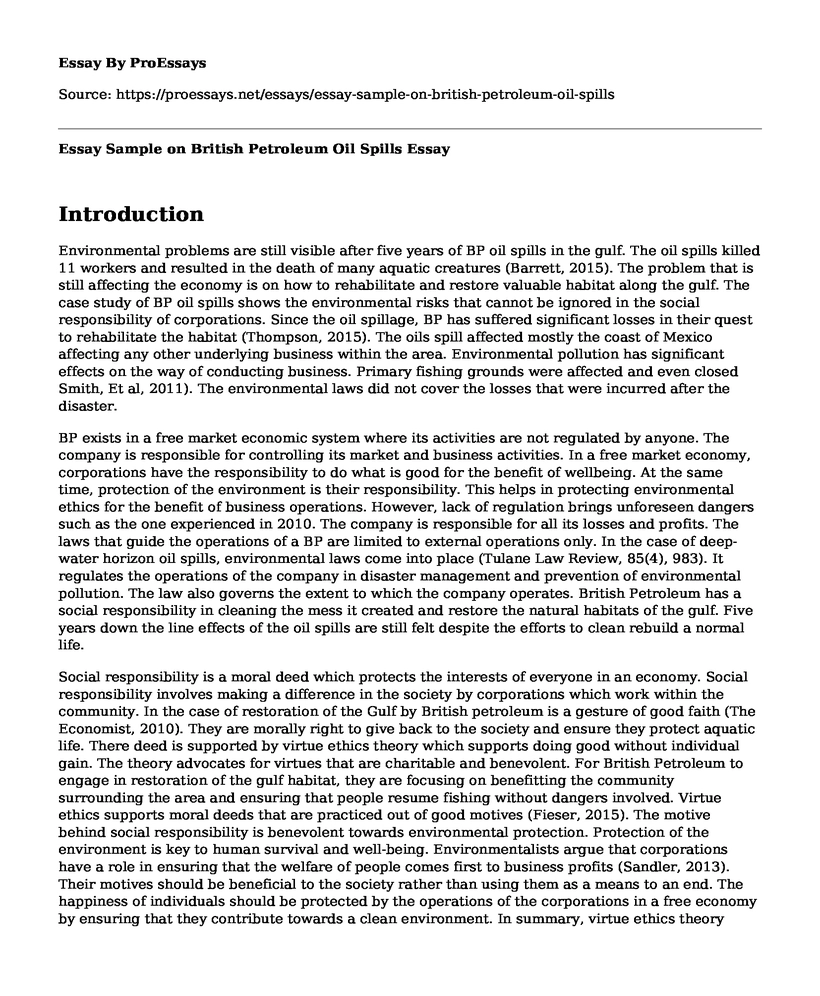Introduction
Environmental problems are still visible after five years of BP oil spills in the gulf. The oil spills killed 11 workers and resulted in the death of many aquatic creatures (Barrett, 2015). The problem that is still affecting the economy is on how to rehabilitate and restore valuable habitat along the gulf. The case study of BP oil spills shows the environmental risks that cannot be ignored in the social responsibility of corporations. Since the oil spillage, BP has suffered significant losses in their quest to rehabilitate the habitat (Thompson, 2015). The oils spill affected mostly the coast of Mexico affecting any other underlying business within the area. Environmental pollution has significant effects on the way of conducting business. Primary fishing grounds were affected and even closed Smith, Et al, 2011). The environmental laws did not cover the losses that were incurred after the disaster.
BP exists in a free market economic system where its activities are not regulated by anyone. The company is responsible for controlling its market and business activities. In a free market economy, corporations have the responsibility to do what is good for the benefit of wellbeing. At the same time, protection of the environment is their responsibility. This helps in protecting environmental ethics for the benefit of business operations. However, lack of regulation brings unforeseen dangers such as the one experienced in 2010. The company is responsible for all its losses and profits. The laws that guide the operations of a BP are limited to external operations only. In the case of deep-water horizon oil spills, environmental laws come into place (Tulane Law Review, 85(4), 983). It regulates the operations of the company in disaster management and prevention of environmental pollution. The law also governs the extent to which the company operates. British Petroleum has a social responsibility in cleaning the mess it created and restore the natural habitats of the gulf. Five years down the line effects of the oil spills are still felt despite the efforts to clean rebuild a normal life.
Social responsibility is a moral deed which protects the interests of everyone in an economy. Social responsibility involves making a difference in the society by corporations which work within the community. In the case of restoration of the Gulf by British petroleum is a gesture of good faith (The Economist, 2010). They are morally right to give back to the society and ensure they protect aquatic life. There deed is supported by virtue ethics theory which supports doing good without individual gain. The theory advocates for virtues that are charitable and benevolent. For British Petroleum to engage in restoration of the gulf habitat, they are focusing on benefitting the community surrounding the area and ensuring that people resume fishing without dangers involved. Virtue ethics supports moral deeds that are practiced out of good motives (Fieser, 2015). The motive behind social responsibility is benevolent towards environmental protection. Protection of the environment is key to human survival and well-being. Environmentalists argue that corporations have a role in ensuring that the welfare of people comes first to business profits (Sandler, 2013). Their motives should be beneficial to the society rather than using them as a means to an end. The happiness of individuals should be protected by the operations of the corporations in a free economy by ensuring that they contribute towards a clean environment. In summary, virtue ethics theory proposes that social responsibility should be geared towards achieving a better environment without any expected profitable gains (Cherry and Sneirson, 2010).
References
Albany Law Review, 74(1), 563-585. Retrieved from http://www.researchgate.net/profile/Murphy_Smith/publication/228264531_Analysis_of_Environmental_and_Economic_Damages_from_British_Petroleums_Deepwater_Horiz.
Barrett, P. (2015, April 16). The BP oil spill cleanup isn't a disaster: Five years after the Deepwater Horizon disaster, recovery is progressing better than expected
Cherry, M. A., & Sneirson, J. F. (2010). Beyond Profit: Rethinking corporate social responsibility and greenwashing after the BP oil spill
Fieser, J. (2015). Introduction to business ethics
Sandler, R. L. (2013). Environmental virtue ethics The International Encyclopedia of Ethics. Retrieved from http://onlinelibrary.wiley.com/doi/10.1002/9781444367072.wbiee090/pdf
Smith, L. C., Smith, L. M., & Ashcroft, P. A. (2011). Analysis of environmental and economic damages from British Petroleum's Deepwater Horizon oil spill.
The Economist. (2010, September 9). The case for the defense. Retrieved from https://www.economist.com/node/16996781 .
Thompson, A. (2015, April 20). Five years after the BP oils spill, questions linger in the Gulf
Tulane Law Review, 85(4), 983. Retrieved from http://papers.ssrn.com/sol3/Papers.cfm?abstract_id=1670149
Cite this page
Essay Sample on British Petroleum Oil Spills. (2022, May 16). Retrieved from https://proessays.net/essays/essay-sample-on-british-petroleum-oil-spills
If you are the original author of this essay and no longer wish to have it published on the ProEssays website, please click below to request its removal:
- Essay on Preventing Climate Change
- The Emergence of the Jet Engine - Paper Example
- Aerospace Engineering Essay Example
- Essay Example on Nuclear Energy: Advantages & Disadvantages in Engineering
- High-Risk Behaviors Seen in Schools, Emergency Management and Disaster Planning
- Essay Sample on Climate Change: Human vs Natural Causes
- Annotated Bibliography on Katrina's Impact on New Orleans







